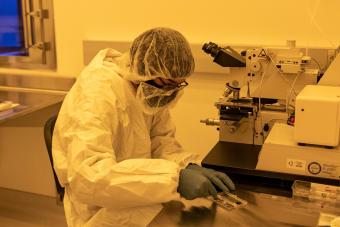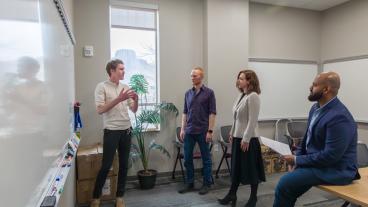Elevate Quantum puts Colorado – and Mines – at forefront of future innovation

The United States is looking to quantum information to revolutionize the nation’s future, and Colorado – and the Colorado School of Mines – are poised to be at the forefront of the effort.
The U.S. Department of Commerce Economic Development Administration has designated Elevate Quantum as a Regional Technology Hub for Quantum Information Technology. A regional consortium of over 70 organizations, including Mines, Elevate Quantum is driving innovation in Colorado, New Mexico and Wyoming.
“The U.S. needs to be tech ready,” said Lincoln Carr, professor of physics and Mines’ representative to Elevate Quantum. “In some areas, we’re not and Elevate Quantum is a way to bring the country up to speed. This is what the United States needs.”
The U.S. Economic Development Administration designates regional technology and innovation hubs with the aim to strengthen economic and national security. Elevate Quantum Colorado is one of 31 tech hubs around the country and one of only two dedicated to quantum specifically. The Colorado consortium aims to “solidify the region’s global leadership in quantum information technology to increase infrastructure resilience and strengthen the quantum hardware supply chain.”
Colorado was a natural choice for a quantum hub, Carr said, both because of its connections to the industry-driven Quantum Economic Development Consortium and the state’s deep supply chain in the quantum industry. Colorado is also well positioned to help grow the quantum workforce. Back in the 1990s, the state invested in higher education initiatives that eventually became quantum-focused companies, adding to the supply chain strength seen today. Building off that strength, Mines jumpstarted its quantum engineering program to prepare people for careers in quantum.
“Colorado is the No. 1 center for quantum industry in the world,” Carr said.
Mines is home to one of the first master’s degree programs in quantum engineering in the U.S. The university also offers a graduate certificate and an undergraduate minor. The program is designed to introduce those with a STEM background to quantum in a way that gets them ready to engage with the industry in just one semester.
“Mines is one of the leaders in quantum education,” Carr said. “From the administration down, it’s very student-centric and faculty really care about their students. And this environment is why we were able to create our quantum program so quickly and turn it into a signature program.”
But why is quantum so crucial? A big piece of the answer is because the future of technology rests on a system that’s going to eventually expire.
“All the technology we use in the world now runs off of energy that won’t last,” Carr said. “World energy production goes up 2 percent each year, but computing energy use doubles every three years. So that means between 2030 and 2040, we will run into the market limit for energy for computing. There’s going to be no way to run the current computing base that we have over the next decade or two. Quantum computing is a key part of changing computers themselves and addressing the energy aspect.”
But computing energy isn’t the only issue where quantum can help. Quantum can also address technology issues across industries from cyber security to MRI to GPS.
That broad application is a key aspect of Mines’ quantum program, too. Students will understand how to combine different disciplines, like physics, materials science, computer science, electrical engineering, chemistry and mathematics, to address emerging technology needs. That means interested students from many different backgrounds can come to Mines and be poised to literally shape the future.
“Mines got its quantum programs up and running before a lot of other places,” Carr said. “We’re serving a broader population and opening up the field to people who wouldn’t have considered it before. Mines continues to be the best deal in public education, in engineering and in quantum specifically.”




